Last Chance to Catch NYC's Holiday Notalgia Train
We met the voices of the NYC subway on our nostalgia ride this weekend!


October is a great time to visit some of the newest public art installations throughout New York City — while abiding by the health and safety guideline with social distancing and mask wearing. With the Photoville festival taking place over different boroughs for the ninth year and Union Square’s climate clock making a buzz on the headlines for marking the end of civilization on Earth, October offers some new additions to the already expansive art installation checklist from September. During these challenging times, perhaps we can experience a little rest from Optical Animal’s Projection Napping at Time Square and browse through the graffiti wall in Bowery. Here are the public art installations on display in New York City this October:
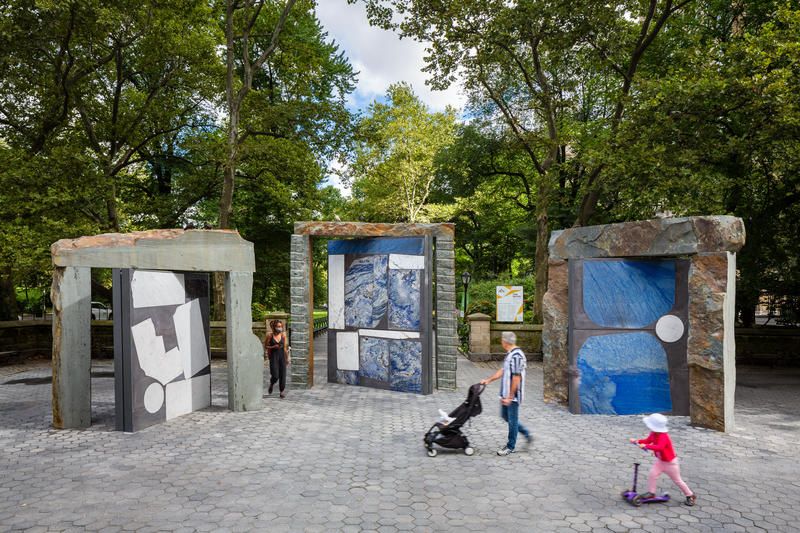
Photo by Nicholas Knight, Courtesy Public Art Fund
At Doris C. Freedman plaza there are three newly created stone sculptures made with a hybrid of imported and native materials. The mastermind behind the installation is artist Sam Moyer who uses this creation as an opportunity to pay homage to Public Art Fund founder Doris C. Freedman.
According to Public Art Fund’s website, “these polished stones bear the markings and shapes of their original uses. They also display the unique colors, patterns, and geological history of their sources — quarries in Brazil, China, India, Italy, and beyond. Each stone in Moyer’s mosaic compositions takes on an even more striking hue against the others and the locally-quarried rock, an apt metaphor that encourages us to consider the diverse character of our city and our interconnected lives within it.” The installation will run from September 16, 2020 to September 12, 2021.
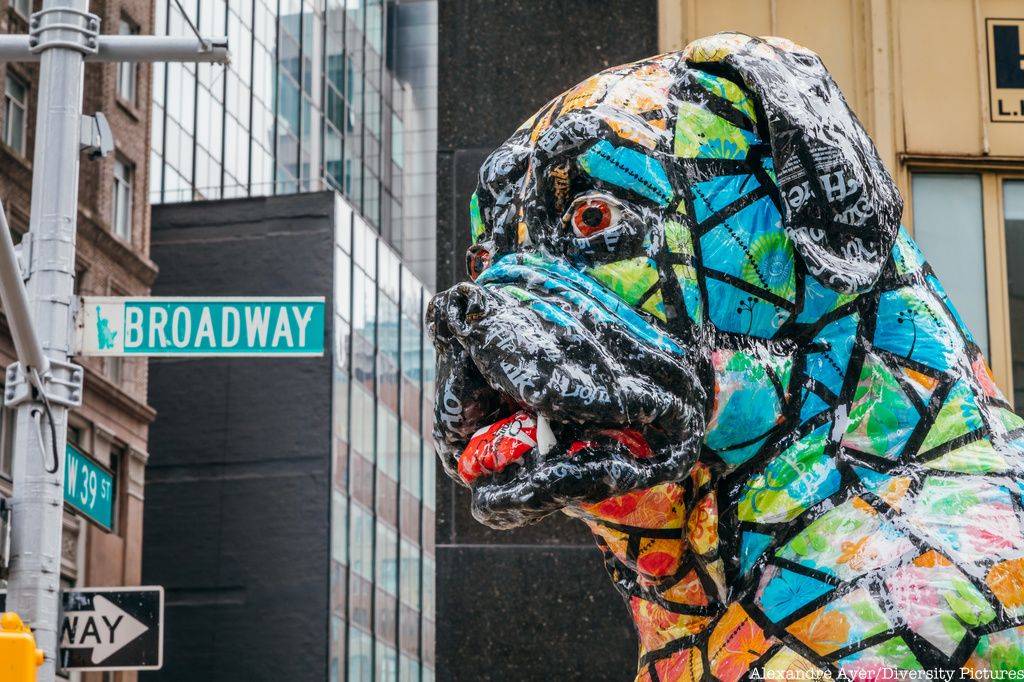
Photo: Alexandre Ayer/Diversity Pictures
“Doggy Bags,”, the latest art installation on Broadway in the Garment District is up and is positively pooch-tastic. The works by New York-based artist Will Kurtz entitled “Doggy Bags” are all made of recycled materials. On display are multiple breeds including an English bulldog named Harriet, chihuahua called Harriet, a pug named Maisy, a bassett hound called Stanley, and a bull mastif known as Daphne. The works are part of a year-round program from the Garment District Alliance and this fall there is an additional impetus: to welcome New Yorkers back to Midtown Manhattan amidst the ongoing city reopening.
“Doggy Bags” will be up through November 20th. Barbara A. Blair, president of the Garment District Alliance said at the opening, “As we welcome New Yorkers back to the neighborhood, we’re proud to showcase Will Kurtz’s colorful, unique dog sculptures through the Garment District Space for Public Art program. We know these beautiful sculptures – made with all recycled materials – will bring positivity, comfort and joy among visitors, and we encourage all to stop by and enjoy the exhibition this fall.”
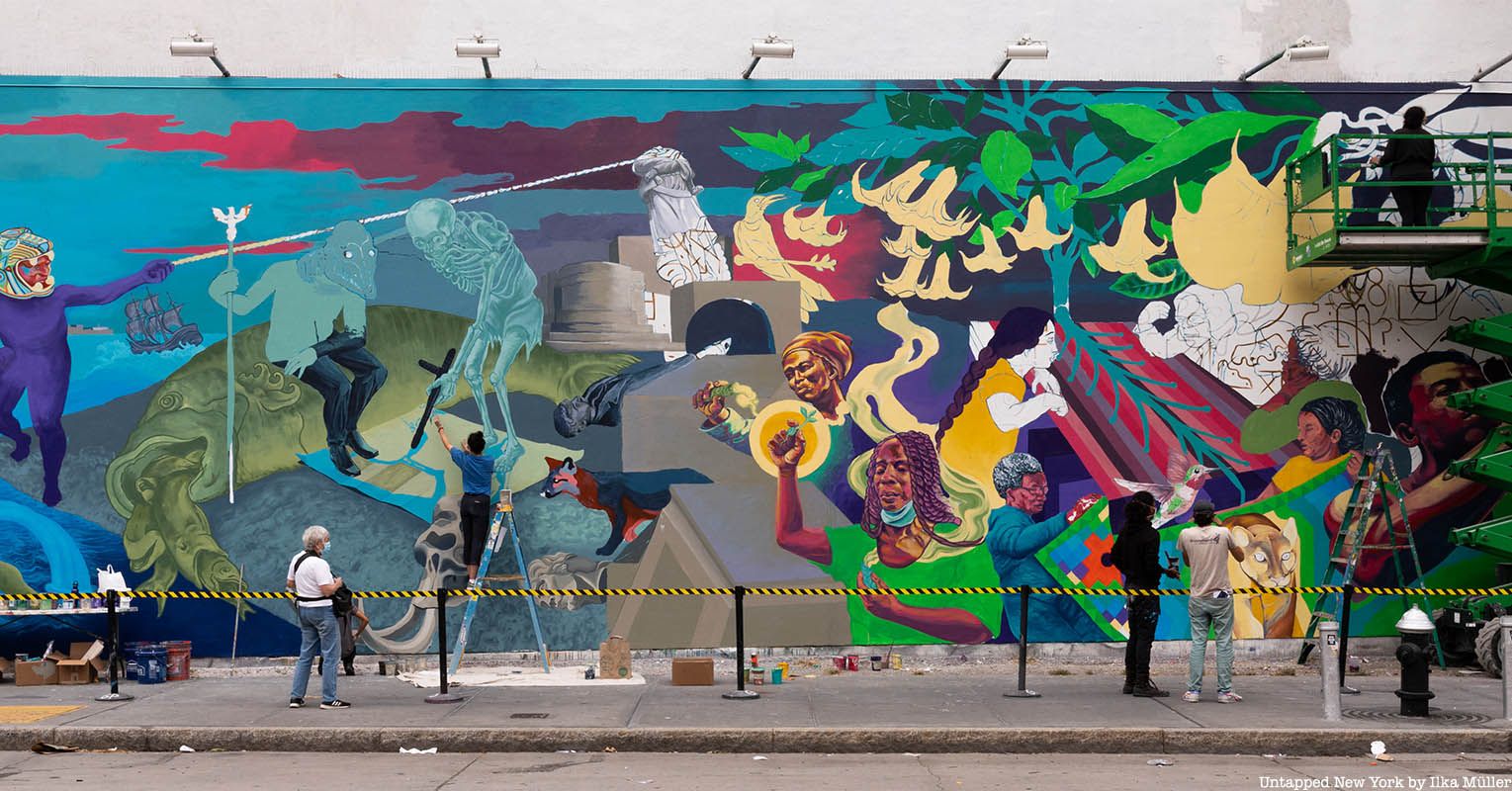
On the Bowery graffiti wall, Groundswell has completed the newest mural to be seen at the street art site in a year. The work was designed by artist Raul Ayala and painted by a team of ten youth artists The last piece, by Japanese artist Tomokazu Matsuyama “Matzu” was completed in September of last year. The mural for 2020 coincides with the 25th anniversary of Groundswell, an organization that uses art for change. The new mural at the Bowery graffiti wall, located on Houston Street between Bowery and Elizabeth streets, incorporates numerous portraits of Black figures and also has a seafaring folklore theme with mythical creatures pulling down statues. On the left side, the skyline of Manhattan appears.
Equidorian-born Raul Ayala has said, “For me, building imagination and sharing knowledge alongside a younger generation of artists is a great manifestation of the fruits of this shift. With this mural, we are also bringing intergenerational participation into a future that honors our past while actively creating a different path of existence.”
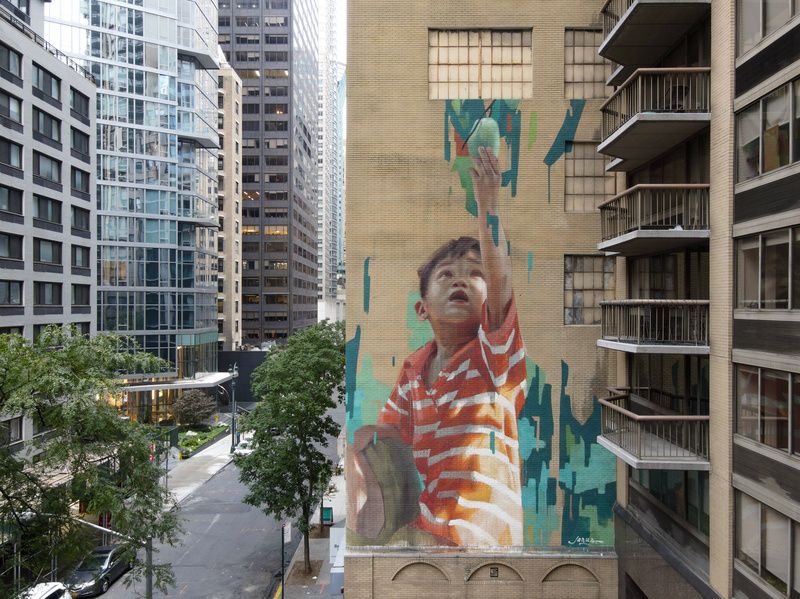
Photo by @just_a_spectator, courtesy Street Art for Mankind
In honor of the United Nations’ 75th Anniversary, a street art mural has been completed a few blocks from the UN headquarters at 243 East 44th Street. The mural is designed by street artist Emmanuel Jarus, in a partnership between the UN and Street Art for Mankind.
According to a press release, “The theme for the mural is inequality and zero hunger, amplifying the voices of the over 1 million people across the world who have told the UN this year that access to basic services, including food, is a top priority for the future they want. Many of our readers and Insider members filled out the survey that led to the results and participated in the events we programmed in Untapped New York’s collaboration with UN75.
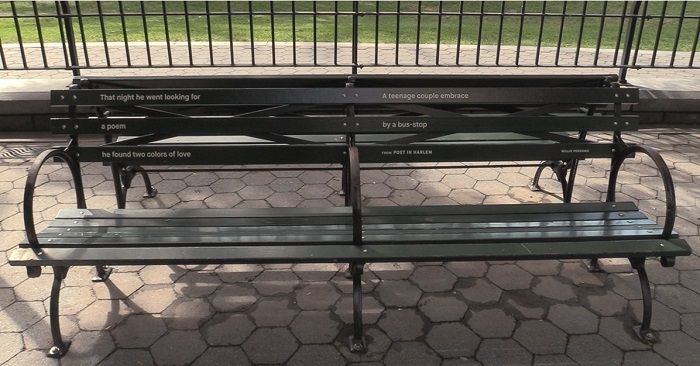
Photo by Daniel Terna
If you walk along the northern length of Battery Park City ,you will find words and phrases from famous poets on benches, banners, pathways, pavers and signs. These words are the work of Poets House and Battery Park City Authority. Together, the organizations launched the Poetry Path which showcases more than 40 poets and their works.
The poems explore the relationships between people, nature and the urban landscape. The installation will be up through 2021.
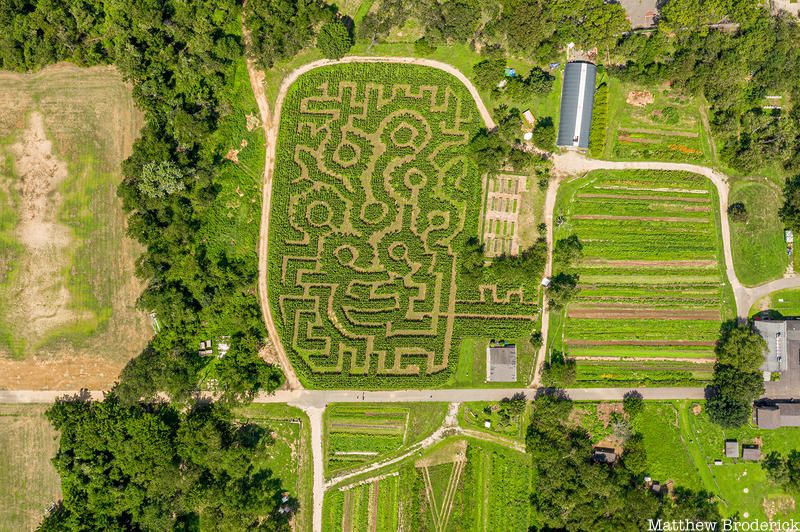
Experience New York City’s only corn maze at the Queens County Farm Museum, this year designed in the shape of Van Gogh’s sunflowers! The Amazing Maize Maze three acres large and the adventure begins with a “Stalk Talk” to prepare visitors for the challenge ahead, who must find their way to Victory Bridge “where the full vista of Van Gogh’s ‘Sunflowers’ is revealed.”
You can get tickets to this NYC corn maze for a daytime exploration, or a Maze by Moonlight event taking place this weekend. The Queens County Farm Museum is offering our Untapped New York Insiders 10% off access to their daytime maze. We’ll be posting the discount code on our members-only Facebook page and in the upcoming weekly email blast. Become a member today!
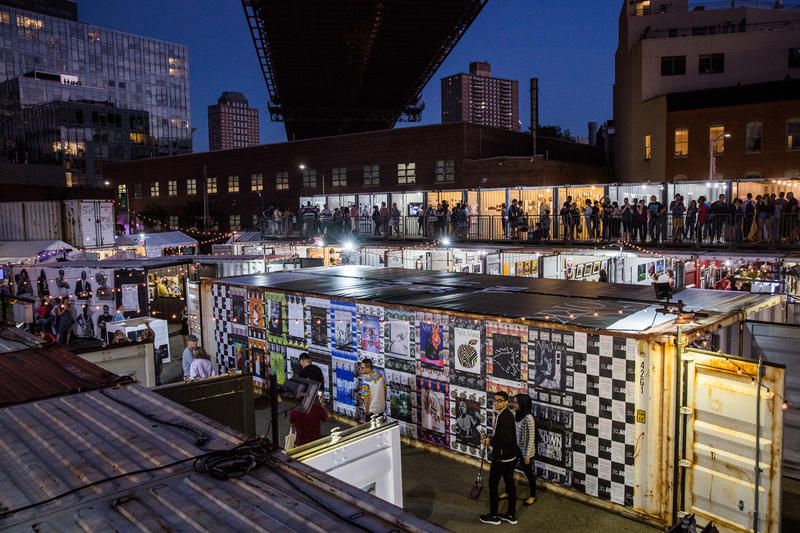
Courtesy of Jessica Bal for United Photo Industries
The ninth annual Photoville festival relaunches this fall with dozens of outdoor art exhibitions shown to visitors from September 17 to November 29, 2020. Arranged by a non-profit organization based in New York, the exhibitions are dotted throughout New York City, with different photo installations in every borough.
Besides the physical public exhibitions, art enthusiasts can also enjoy a variety of free online programs from the comfort of their homes, with events such as online storytelling, artist talks and workshops.
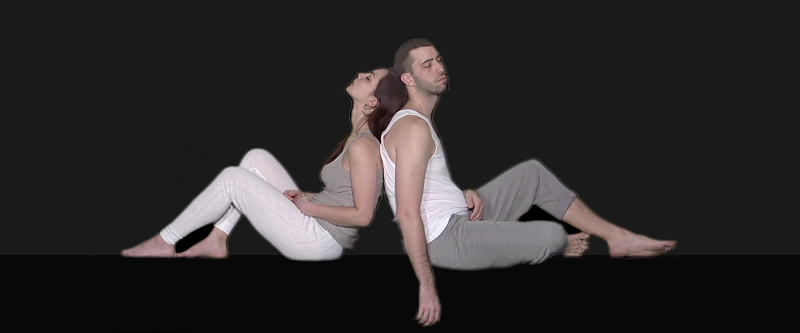
Photo courtesy of Cultural Counsel
Time Square Arts’ Midnight Moment series debuts Project Napping in October. The creator behind the project Optical Animal, a digital artist collective, started this video installation project back in 2016 and had featured the project in Berlin and Rome before coming to New York. If visitors walk through Time Square between 11:57 pm and midnight during any day in October, they would see dozens of video installations displaying giant sleeping figures on the electronic billboards.
According to what visionaries behind the project said in a press statement, Times Square’s installation is meant to “offer a shared moment of respite” in a city known as the city that never sleeps. Optical Animal said in a press statement that “the concept for Projection Napping grew out of a desire to locate a more human, and more interpersonal realm for the medium of projection mapping. Building off of a play on words, the project dives into an exploration of sleep, and the line we draw between private and public space.
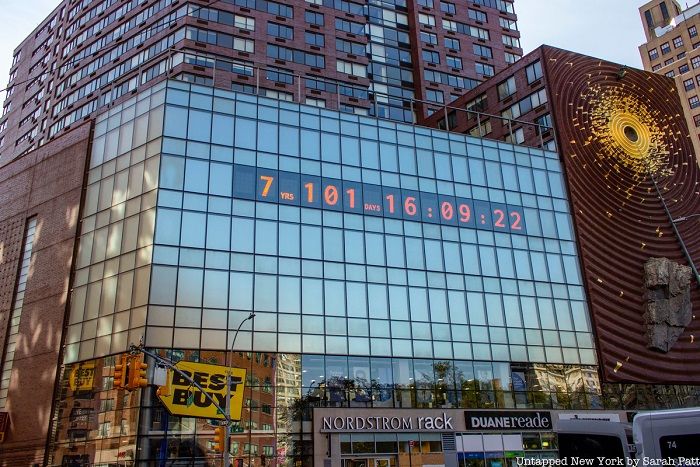
As part of the lead up to Climate Week, the Union Square clock has been repurposed as a “Climate Clock” showing what time the world has left to take action on climate change. As per the Climate Clock website, the Climate Clock “follows the methodology of the carbon clock made by the Mercator Research Institute on Global Commons and Climate Change (MCC) which uses data from the recent IPCC Special Report on Global Warming of 1.5°C. The report states that starting from 2018, a carbon dioxide budget of 420 Gt of CO2 gives us a 67% chance to stay under 1.5°C of warming.” The countdown shows, at current rates of emission, how long it will take to burn through the earth’s “carbon budget” or the amount of carbon dioxide that can be released into the atmosphere while keeping global warming to 1.5°C above pre-industrial levels.
A second number, not seen in the Union Square Climate Clock, shows the “growing % of the world’s energy currently supplied from renewable sources. This is our lifeline. Simply put, we need to get our lifeline to 100% before our deadline reaches 0.”
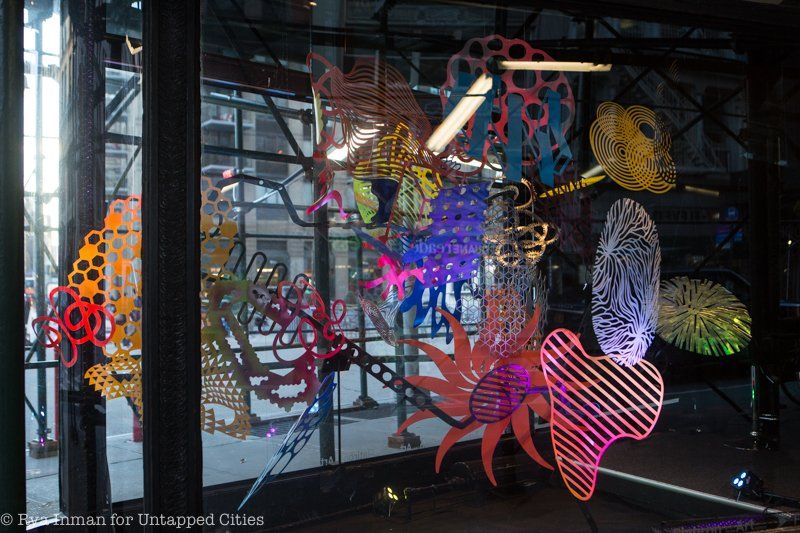
A previous art installation at the Flatiron Building
October welcomes the Digital Art Month that features exhibitions throughout Manhattan. A collaboration between Flatiron/23rd Street Partnership, Contemporary and Digital Art Fair and other neighborhood organizations, the artworks make use of technology and augmented reality to adjust to the pandemic and socially distanced setting, giving audiences the options to look at the exhibitions through the medium of QR codes and video art screenings.
The event starts on October 1 and continues until the end of the month.”
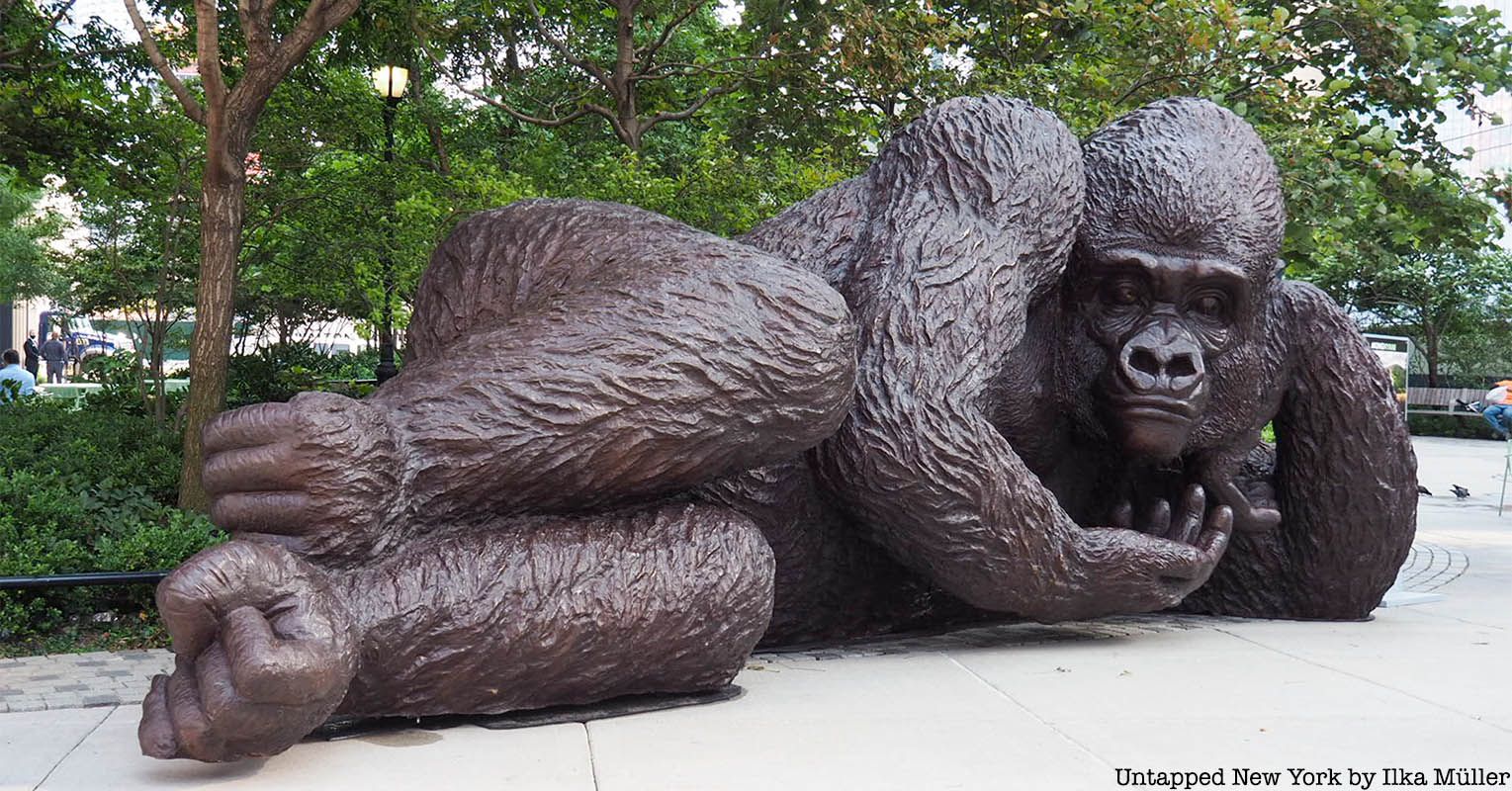
The largest bronze gorilla statue in the world has arrived in New York City. Since last week, King Nyani has been on display at Bella Abzug Park in Hudson Yard. The statue is designed to raise awareness about the endangered mountain gorilla species, of which only around 1000 remain worldwide, and to change the perception of gorillas among New Yorkers. Instead of terrorizing New York City atop the Empire State Building, this gorilla will be giving out free hugs to any willing New Yorkers. In fact, its giant hands are designed to hold 2 to 3 people at a time.
King Nyani is a continuation of a series of works by Gillie and Marc, donated to place around the world, which have highlighted endangered species as part of their initiative Love the Last. Their statues of the last three northern white rhinos were on display in Astor Place in 2018 (now only two of the rhinos remain). King Nyani is based on an actual gorilla, the head of a family of mountain gorillas that Gillie and Marc met on a trip to Uganda. It is almost 23 feet long, 8.5 feet high and weighs 4,766 pounds. See more photos here.
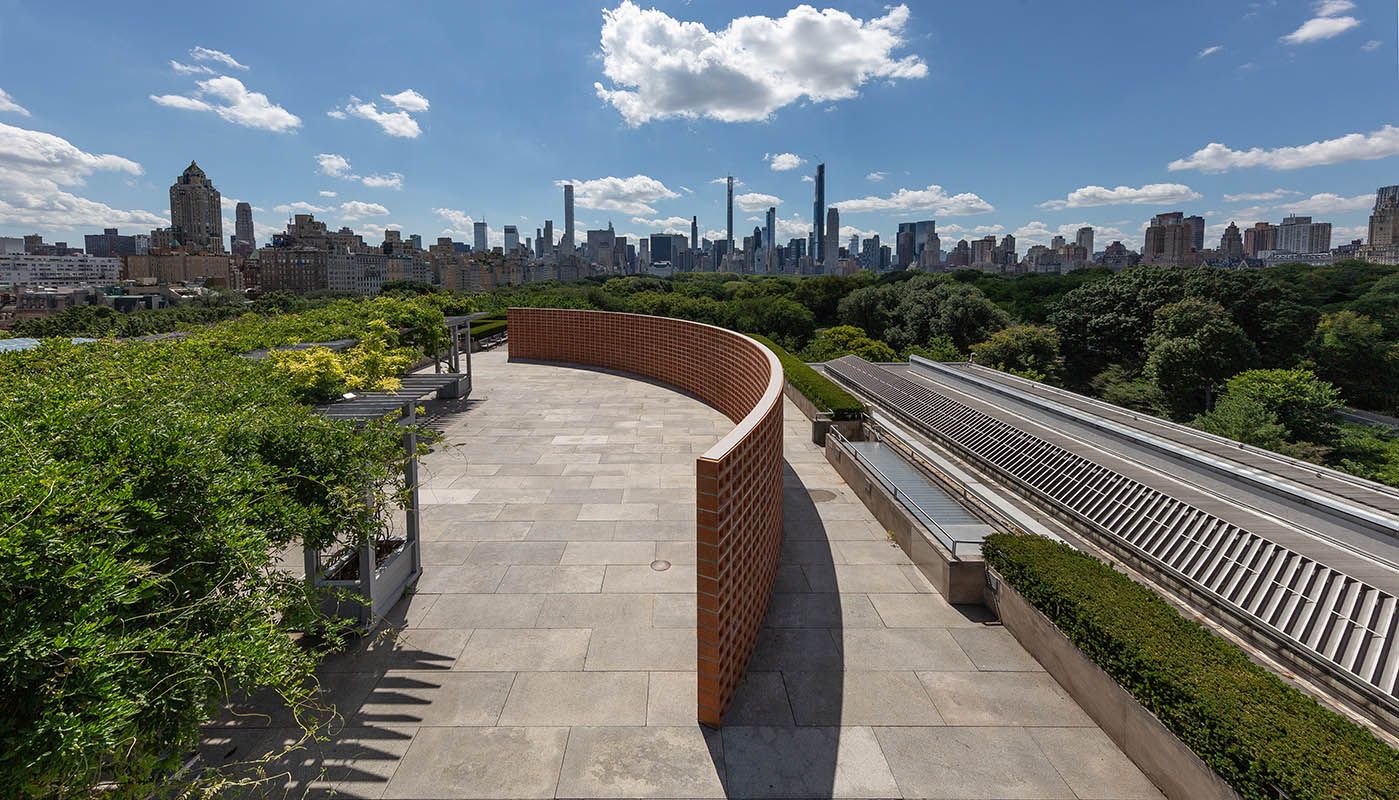
The 2020 Met Roof Garden Commission by Héctor Zamora, Lattice Detour. Photo courtesy of the artist.
Last week, the Metropolitan Museum of Art unveiled several new exhibits, including this year’s Roof Garden Commission by Héctor Zamora, Lattice Detour. From a distance, Lattice Detour looks like an abstract sculpture, its material construction not completely obvious. What’s apparent is the disruption it provides to the view so traditionally celebrated and embraced by past exhibitions. But this move is deliberate. According to the Museum, Zamora “intends for us to have this initial response: such is the impact of barriers that thwart access to open, expansive outlooks on the world.” It perforates our view but intrigues us, and its position on the roof, invites visitors to go around it.
The terra cotta bricks, made of Mexican earth, which form the basic unit of Lattice Detour are open to allow for light and air. It is meant to reference “celosia“, “openwork brick structures found in vernacular architecture of the Middle East, Africa, Iberia, and Latin America that provide shade and ventilation,” states the museum. See more photos here.
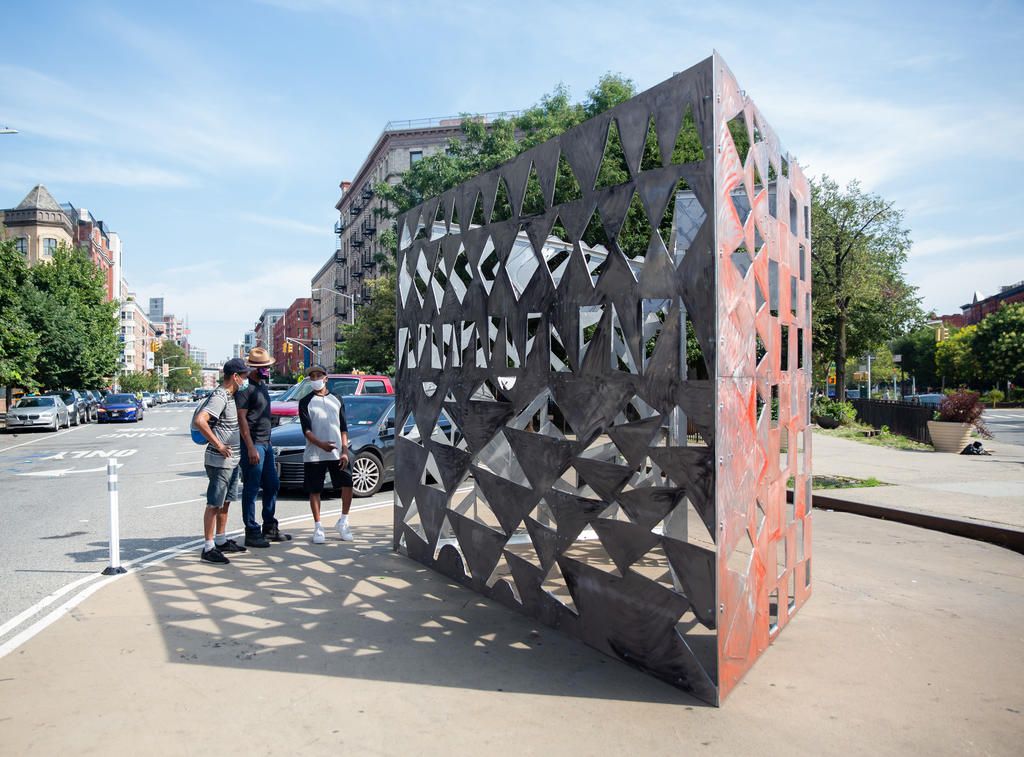
Photo courtesy of the Department of Transportation.
The New York City Department of Transportation’s Art Program, Harlem based non-profit, the Marcus Garvey Park Alliance and New York-based artist Kenseth Armstead recently unveiled the Boulevard of African Monarchs monument. Located at 116th Street and Adam Clayton Powell Blvd/St. Nicholas Avenue in Manhattan, the sculpture features representations of the multiple African kings. The sculpture itself is equally grand, a 10′ x 10′ x 10′ monument made to emulate the style of Tiebele house paintings, a style of artwork made by African women long before the transatlantic slave trade began its cruel existence.
Boulevard of African Monarchs is the first sculpture in Armstead’s Sankofa_series. The works are meant to celebrate Africans and their diaspora and to proclaim that Black Lives Matter with bold, three-dimensional artwork. The work is a monument to Black beauty, and is free for all to view in public.
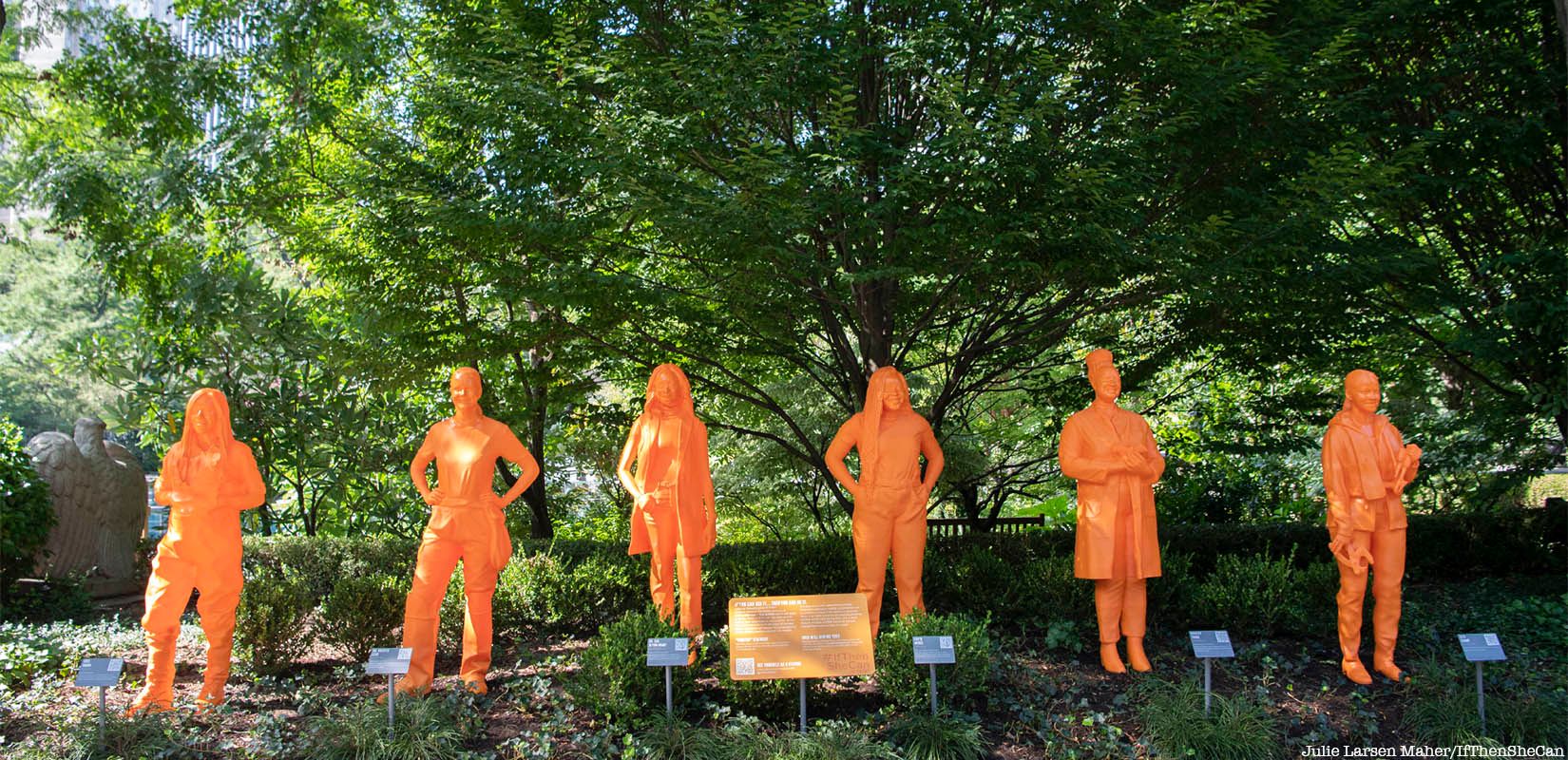
A preview of the #IfThenSheCan exhibit is on display in central park from August 17 through October 31. The exhibit features 3D printed statues of notable female scientists who have made tremendous contributions to their fields of work. The six women who will be displayed are Kristine Inman (wildlife biologist), Rae Wynn-Grant (ecologist), Dorothy Tovar (microbiologist), Jess Champ (shark researcher), Earyn McGee (herpetologist), Kristen Lear (bat conservationist).
The project represents a collaboration between the Central Park Zoo and the If/Then organization. The Central Park Zoo has recently reopened at a reduced capacity due to the COVID-19 pandemic and only visitors who have previously reserved tickets online will be able to enter. Even with these extra measures in place, the exhibit is meant to inspire women by celebrating women who are already extremely successful in a wide array of STEM fields. See more photos here.
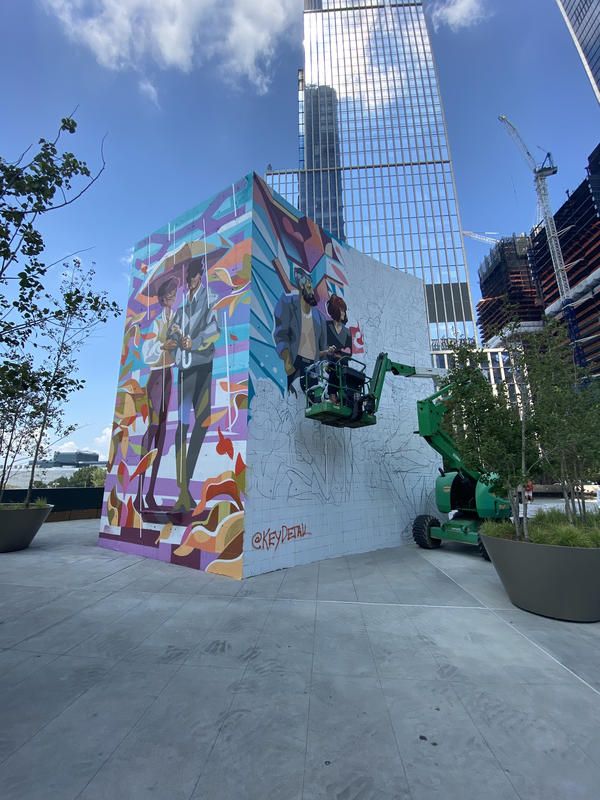
Photo by Dave Siedler.
Hudson Yards’ popular public art exhibition #HYxOffTheWall is coming to life outdoors with renowned, local artists hard at work. New large-scale murals will be visible outside on the walls of the Public Square and Gardens at Hudson Yards.
The outdoor art installation is produced by the art agency Muros and features the work of a diverse group of artists, including notable muralist Key Detail and street artist Elle. With the specific location of Hudson Yards in mind, all artwork relate back to the site’s past, present, or future. The original works will occupy more than 5,000 square feat of walls along 11th Ave. and celebrate inclusion and togetherness. The large scale pieces also welcome interaction which will allow visitors to engage directly with the art.

Jeffery Gibson; ‘Because Once You Enter My House It Becomes Our House; 2020; Courtesy the Artist; Socrates Sculpture Park; Sikkema Jenkins & Co., New York; Kavi Gupta, Chicago; Roberts Projects, Los Angeles; Image by Scott Lynch.
A massive new piece, named Because Once You Enter My House, It Becomes Our House, is now on display at Socrates Sculpture Garden in Queens. The vibrantly colored sculpture was created Jeffery Gibson, recipient of the 2019 MacArthur Foundation “Genius Grant.” It is meant to serve as a monument to inclusion and diversity.
Because Once You Enter My House, It Becomes Our House draws inspiration from and pays visual homage to Indigenous North American peoples, pre-Columbian Mississippian architecture, and to modern-day queer camp aesthetics. The multi-tiered structure is a reference to the architecture of the ancient city of Cahokia, the largest city of the North American Indigenous Mississippi people. In addition to the sculpture, Gibson and the Socrates Sculpture Garden have curated a series of Indigenous led performances that will take at the park in the coming months.
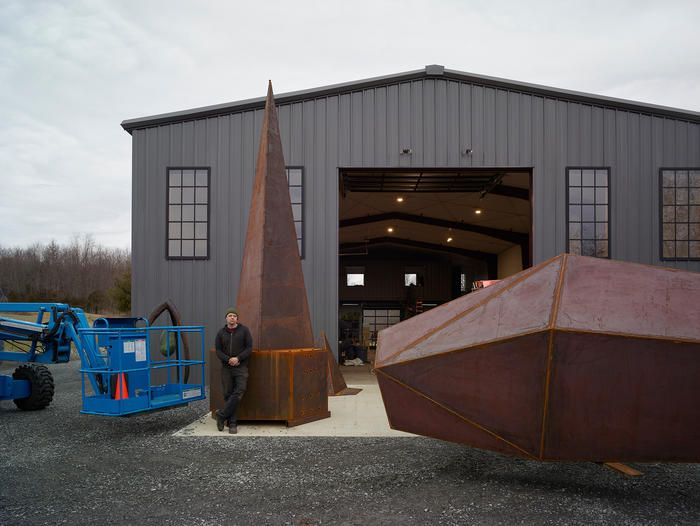
Kris Perry stands with pieces of Mother Earth outside of his studio. Photo by Daniel McCabe.
On August 12, a new, 35-foot-tall steel sculpture named Mother Earth was unveiled at Rockaway Beach in Queens. The installation is the brainchild of artist Kris Perry. It is a part of NYC Parks’ Art in the Parks, a program that brings both experimental and traditional pieces of artwork to public locations throughout the five boroughs.
The towering statue is made of Corten steel, a material that is meant to evolve and change with the seasons and the site. Mother Earth will be located at the Beach 98th Street entrance to Rockaway beach, two blocks away from the A Train. Rockaway Beach is also serviced by the NYC Ferry.

Photo: Nicholas Knight, Courtesy of Public Art Fund, NY
Reverberation, a new piece by sculptor Davina Semo is now on display along the waterfront in Brooklyn Bridge Park. The large-scale installation is made up of interactive bells and is meant to evoke public modes of communication that harken back to New York City’s maritime history. Located adjacent to the Brooklyn Bridge, the piece explores our relationship to industrial material and the built environment. And yes, park visitors can ring the bells!
The installation is supported by the Public Art Fund and was curated by Daniel S. Palmer. The Public Art Fund uses contributions from individuals, corporations, and private foundations to support works of art throughout the five boroughs, including the artwork at LaGuardia Airport’s new Terminal B.
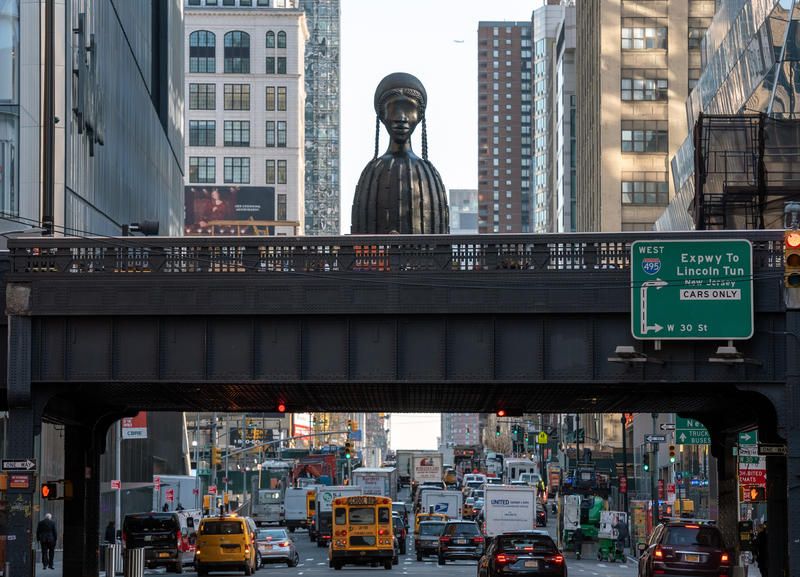
Simone Leigh, Brick House, 2019. A High Line Plinth commission. On view June 2019 – September 2020. Photo by Timothy Schenck. Courtesy the High Line
For about two months, Simone Leigh’s Brick House has been admired from afar as it loomed over 10th avenue. This month, visitors can get an up close look at the giant sculpture when the Spur, the newest section of the High Line opened on June 5th. It is the first sculpture to be displayed in the new space, which will host a series of rotating exhibits.
Brick House, a sixteen-foot-tall bronze bust of a black woman. Her head is adorned with an afro and cornrow braids along her hairline. The figure sits atop the Plinth, a new exhibition space at on the plaza of the Spur. Brick House is the first work in the series Anatomy of Architecture by Simone Leigh. The series of sculptures will intermingle architectural forms from West Africa to the American South with the human body. Brick House has been extended until Spring 2021.
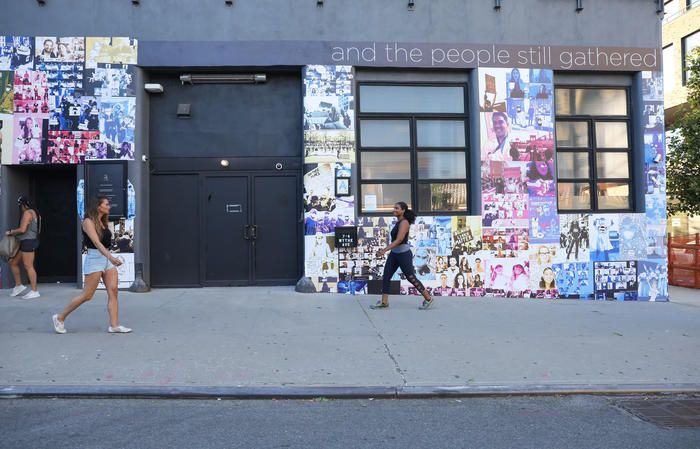 Photo Courtesy of 74 Wythe.
Photo Courtesy of 74 Wythe.
74 Wythe, a newly opened multi-level event space in Williamsburg, recently unrelieved a large-scale art installation in tribute to the Black Lives Matter movement and the inspiring people fighting the COVID-19 pandemic. The installation, named #74wythefamilarfaces, is a collage of portraits based on recent photographs and events. The piece wraps around the 15,000-square-foot exterior of the building and can be viewed outside while maintaining a safe social distance.
The installation was conceived and directed by Angela Redai of Artine Advisory in partnership with the illustrator Arianna Margulis. The artwork is one of the multiple ways in which 74 Wythe (which was slated to open this summer) is trying to give back to the Brooklyn community. The event space is donating one percent of all profits to various charities such as Black Lives Matter, the Brooklyn Comunity Foundation, and the Stonewall community foundation, and is offering meeting space free of charge to local groups involved in organizing the Black Lives Matter movement.
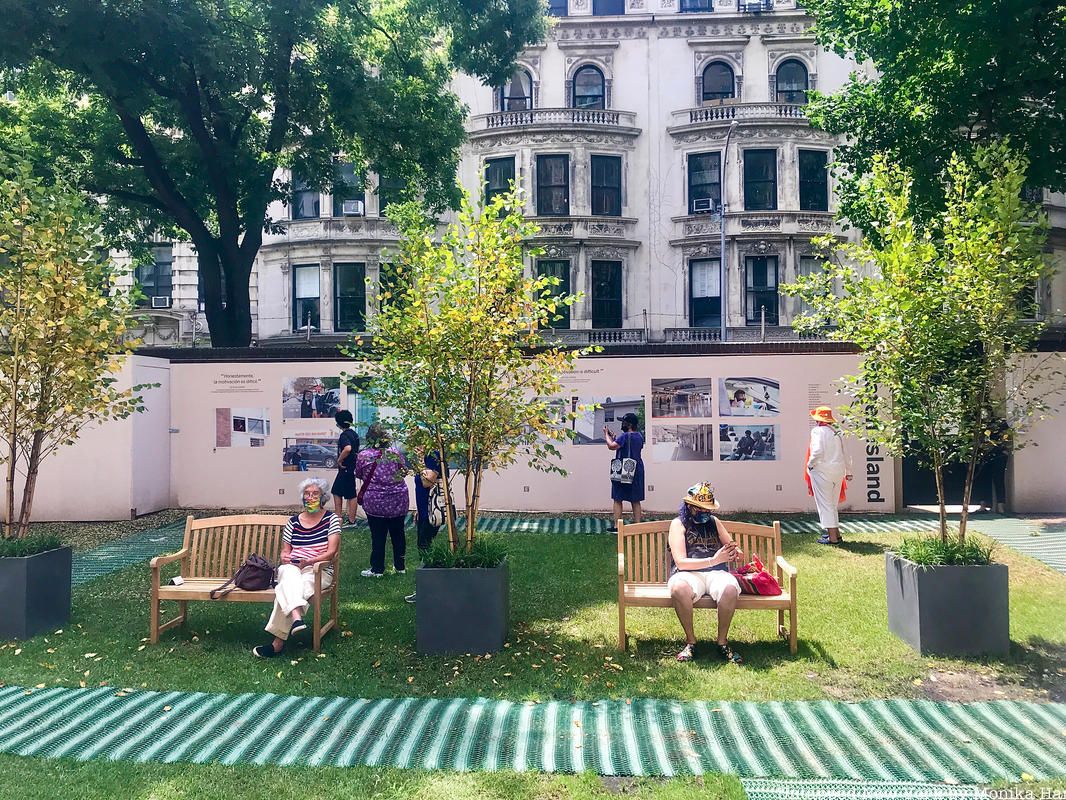
Last month, The New-York Historical Society opened its doors to visitors with “Hope Wanted,” an outstanding outdoor photo installation, which is capturing the experience of living amid the global deadly pandemic. It is focused on the toughest of times New Yorkers had faced in April, at the peak of the coronavirus.
“Hope Wanted: New York City Under Quarantine”, the first curated exhibition New-York Historical Society presented in the outdoor space, features 50 large format photographs by photojournalist Kay Hickman and several oral histories recorded by political activist, poet and journalist Kevin Powell, who originated the whole project. On April 8 and 9 the two of them visited all five boroughs, and, while risking their own health, captured pictures and talked to people from all walks of life about their experience of the pandemic. See more here.
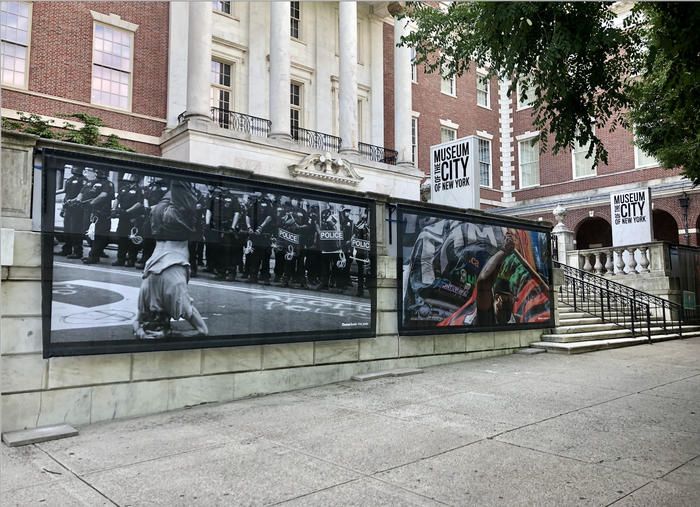 Courtesy of Museum of the City of New York
Courtesy of Museum of the City of New York
On August 1, the Museum of the City of New York will unveil its first outdoor exhibition, New York Responds. The photographic exhibit features images that document the coronavirus pandemic as a singular and monumental event in the city’s history. The powerful images also capture New York’s response to police violence. More than 15,000 images were submitted to the Museum’s open calls for stories and photographs.
Using the hashtags #CovidStoriesNYC and #ActivistNY, New Yorkers made history in real-time. Submissions are reviewed by the museum’s curatorial team on a rolling basis and may be featured on the museum’s social media feed and/or included in the exhibition. New York Responds is the first in a planned series of exhibitions at the museum this year meant to tell the story of 2020 as it unfolds. The public can view New York Responds on the exterior walls and entrances of the Museum of the City of New York.
 Black Lives Matter mural in Lower Manhattan
Black Lives Matter mural in Lower Manhattan
The Black Lives Matter movement has been driving the national conversation on racial justice and has left its mark throughout New York City. In recent months, eight Black Lives Matter murals have been created throughout New York City, with at least one mural in each of the five boroughs. The latest mural to be painted, with the help of Mayor DeBlasio, is on Jamaica Avenue near 150th Street in Queens.
In Manhattan, three murals can be found, one in lower Manhattan near Foley Square, another in Harlem on Adam Clayton Powell Jr. Boulevard, and the last in Midtown directly in front of Trump Tower. Brooklyn has two murals, one on Joralemon Street and another on Fulton Street. The mural the Bronx is on Morris Avenue and the mural in Staten Island is on Richmond Terrace near the Staten Island Ferry.
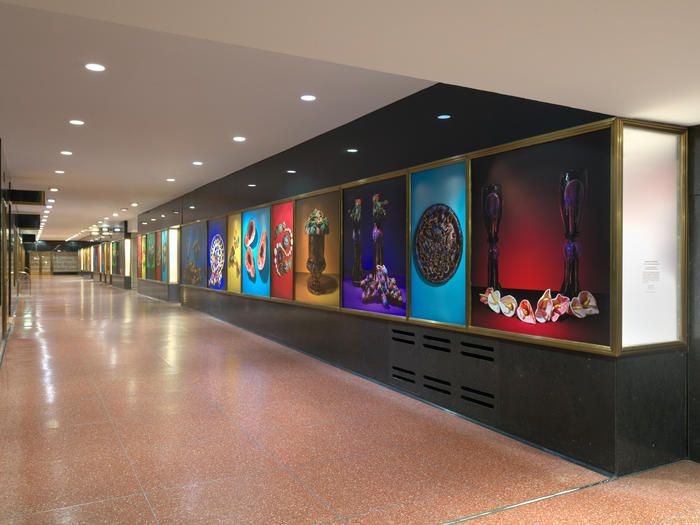
Photo by Dan Bradica, courtesy of Art Production Fund.
The work of Brooklyn-based artist Ryan Flores will be showcased all summer long at Rockefeller Center in a new exhibition entitled Low Life’s: An Upside Down Love Letter. Flores works primarily in the medium of ceramics and uses vibrant colors to attract viewers and play with their expectations. The Low Life’s exhibition will feature three of Flores’ ceramic installations inside of the glass display cases of 45 Rockefeller Center.
Additionally, other examples of Flores’ art will be displayed as large-scale images throughout the Rockefeller Plaza concourse. The exhibition is part of Rockefeller Center’s ongoing Art In Focus series and is produced in partnership with the Art Production Fund.
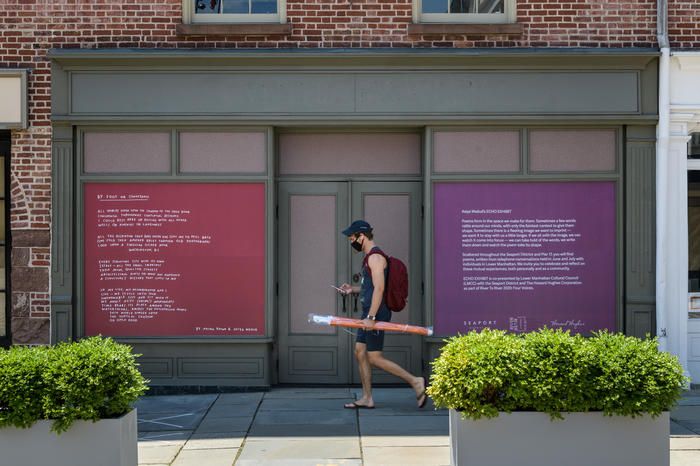
Photo by Ian Douglas.
Scattered throughout the Seaport District and Pier 17, you can now find a series of poems written based on telephone conversations held by individuals in Lower Manhattan during the months June and July. The display of the poems was designed by Shannon Finnegan. The poems, which together are named Echo Exhibit, are meant to serve as lasting evidence of the conversation between strangers during the quarantine, capturing the unique qualities and emotions of the situation.
Echo Exhibit is a part of the Lower Manhattan Cultural Council’s (LMCC) summer festival, an event created in the aftermath of 9/11 to help heal and celebrate the area’s resiliency through the power of art. The festival continues to celebrate resiliency this year as the exhibits are all imbued with the context and meaning of the COVID-19 pandemic.
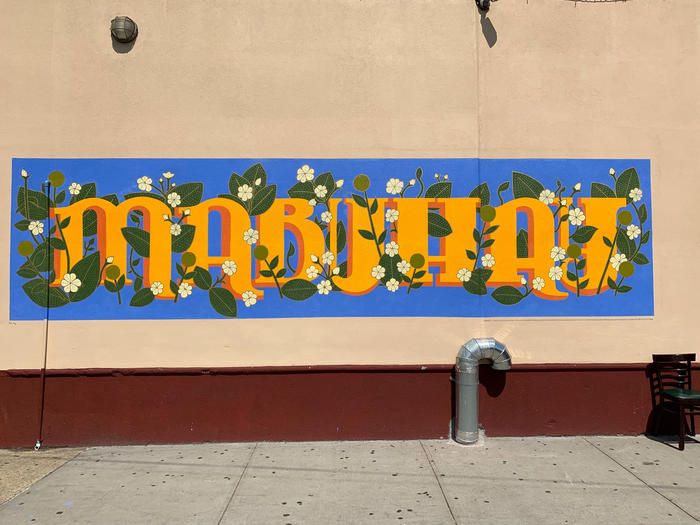
Little Manila Queens Bayanihan Arts, Courtesy The Laundromat Project.
In the Woodside neighborhood of Queens (also known as Little Manila), artists Xenia Diente and Jaclyn Reyes are creating a series of community art pieces to celebrate the area’s Filipino Community. The brightly colored mural on the side of Amazing Grace Restaurant and Bakery, at the corner of 69th Street and Roosevelt Avenue, says “Mabuhay.” This Filipino expression can mean “welcome,” “cheers” or “may you live.”
The two artists are working with Filipino-American residents, local businesses, the Laundromat Project, and other organizations in the neighborhood to create colorful and celebratory murals. Over half of New York City’s Filipino community lives in the borough of Queens. The new mural on Roosevelt Avenue is meant to celebrate the richness of the Filipino experience in Queens and aims to put Little Manila in dialogue with nearby immigrant communities from South Asia, Southeast Asia, and Latin America.
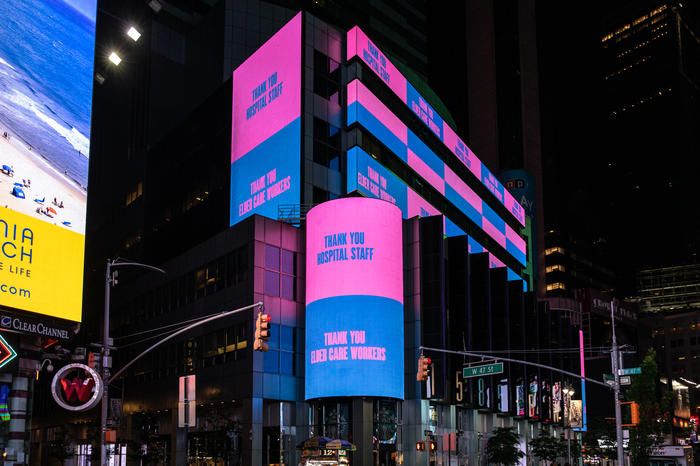
Photograph Courtesy of Maria Baranova
Since April, Poster House and Times Square Arts have partnered on an ongoing series of PSAs displayed throughout 1,800 screens in New York City. Powered by LinkNYC and Times Square Alliance in partnership with For Freedoms and Print Magazine, the city-wide public art project displays messages related to COVID-19 intended to spread New York pride and gratitude for frontline workers.
The messages are featured on 1,774 LinkNYC kiosks and Silvercast billboards like the one above the Lincoln Tunnel. The colorful designs were created by a variety of artists including Milton Glaser, Jessica Hische, Joe Hollier and many more.
Next, check out our upcoming tours to explore more of New York City!
Subscribe to our newsletter